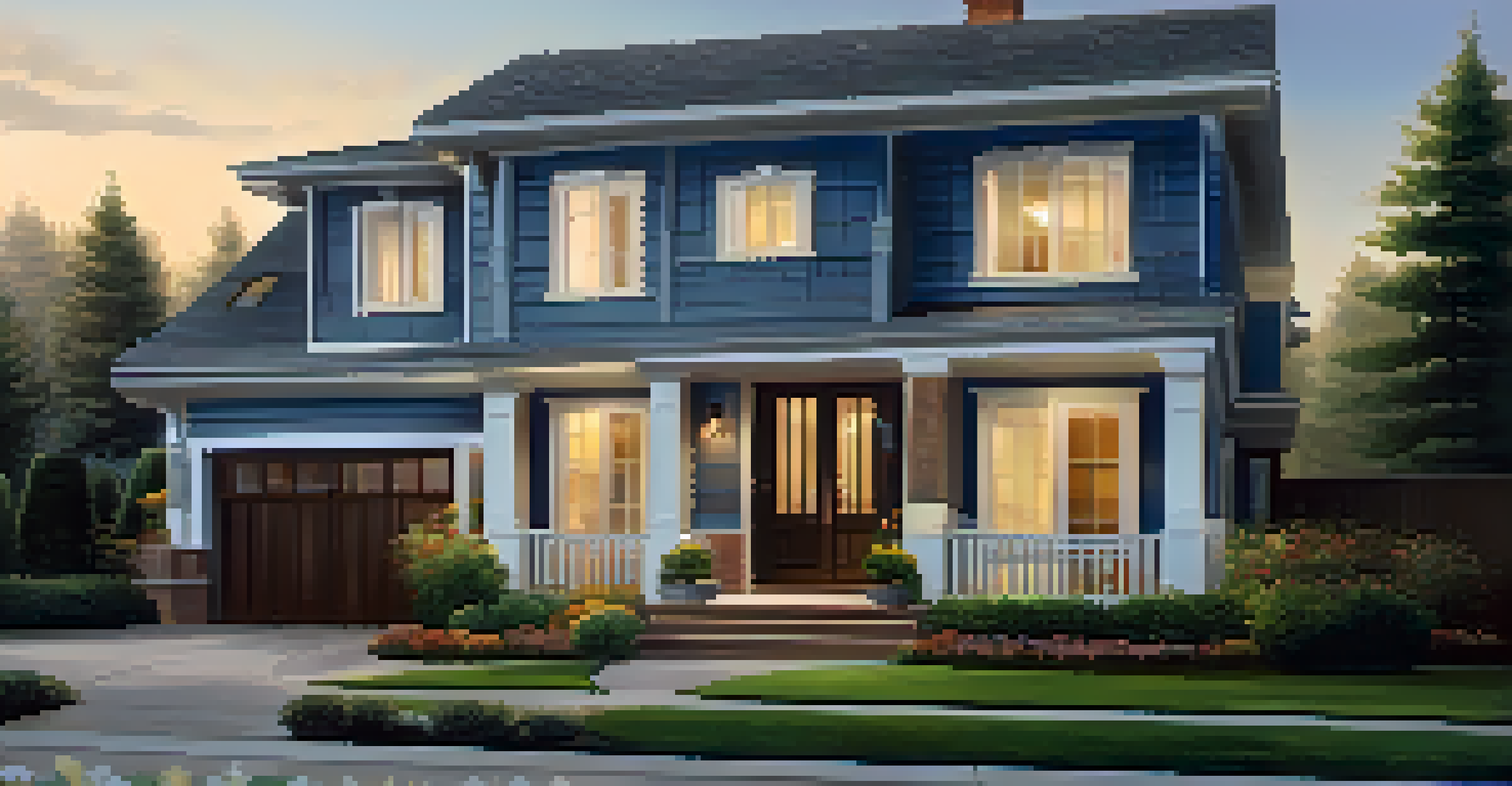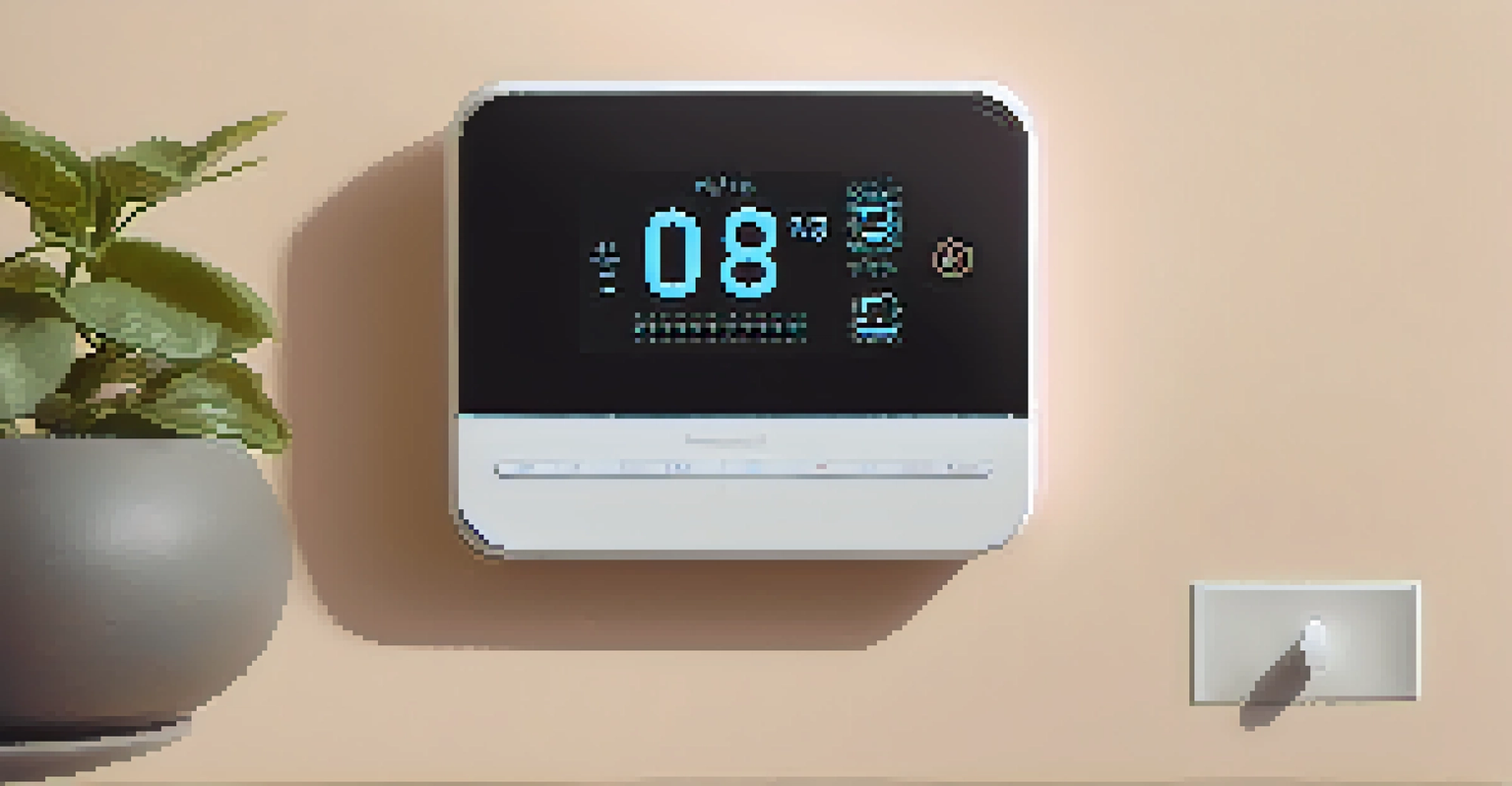Investing in Smart Homes: Future of Real Estate Trends

Understanding Smart Homes: What Are They?
Smart homes utilize technology to enhance the comfort, security, and efficiency of a living space. Imagine a home where you can control the lights, thermostat, and even the security system from your smartphone, no matter where you are. This interconnectedness not only offers convenience but also allows for greater energy management, which is a significant draw for many homeowners today.
The future is already here – it's just not very evenly distributed.
The concept of smart homes blends various devices and systems, often referred to as the Internet of Things (IoT). This means appliances can communicate with each other, leading to automated functions that simplify daily tasks. For instance, your coffee maker might start brewing as soon as your alarm goes off, making your mornings smoother and more efficient.
As technology advances, smart homes are becoming more than just a trend; they are evolving into a necessity for modern living. Homebuyers are increasingly seeking properties that offer these smart features, which can lead to higher property values and quicker sales. So, understanding what makes a home 'smart' is essential for anyone interested in the future of real estate.
The Benefits of Investing in Smart Homes
Investing in smart homes comes with a range of benefits that can appeal to both buyers and investors. For starters, these homes often boast increased energy efficiency, leading to lower utility bills. This not only saves homeowners money but also attracts environmentally conscious buyers who are looking to reduce their carbon footprint.

Furthermore, smart homes often come equipped with advanced security features like smart locks and surveillance cameras. This added peace of mind is a significant selling point for families and individuals alike, making these properties more desirable in the competitive real estate market. Buyers are willing to pay a premium for homes that offer enhanced safety.
Smart Homes Enhance Living Quality
Smart homes leverage technology for improved comfort, security, and energy efficiency, making them increasingly sought after by modern buyers.
Lastly, smart homes tend to have higher resale values, as they are appealing to the growing demographic of tech-savvy millennials and Gen Z. These generations prioritize technology integration when choosing a home, making smart features a key selling point. As the market shifts, investing in smart homes can yield substantial returns.
Market Trends: The Rise of Smart Home Technology
In recent years, the smart home market has seen explosive growth, with more homeowners embracing technology in their daily lives. According to industry reports, the global smart home market is projected to reach hundreds of billions of dollars in the coming years. This trend reflects a shift in consumer behavior where convenience and automation are prioritized.
Technology is best when it brings people together.
Consumers are becoming more informed and discerning when it comes to home features, prompting builders and developers to integrate smart technology into new constructions. For example, many new builds now come equipped with smart thermostats, lighting systems, and even built-in voice assistants. This not only caters to current demand but also positions these properties favorably for future buyers.
As smart home technology continues to evolve, we can expect to see even more innovative solutions entering the market. This ongoing change creates opportunities for real estate investors to capitalize on emerging trends, ensuring that their portfolios remain relevant and competitive.
Challenges of Investing in Smart Homes
While the benefits of smart homes are appealing, there are challenges that investors should consider. One major concern is the rapid pace of technological advancement. What seems cutting-edge today might be outdated in a few years, making it essential for investors to choose adaptable technologies that can evolve.
Additionally, the initial cost of integrating smart technology can be significant. From smart thermostats to security systems, the price tag can add up quickly. Investors must weigh these costs against potential returns, ensuring they make informed decisions that align with their financial goals.
Investing Yields Long-Term Benefits
Investing in smart homes can lead to lower utility costs, enhanced safety features, and higher resale values in a tech-driven market.
Lastly, not all buyers may be comfortable with smart home technology, particularly older generations who may prefer traditional setups. This can limit the pool of potential buyers and impact resale values. Understanding your target market is crucial when investing in smart properties to ensure you meet their needs.
Financing Smart Home Investments
Financing a smart home investment can be approached similarly to traditional real estate investments, but there are unique considerations. Many lenders are beginning to recognize the value added by smart home features and may offer favorable financing options for such properties. This could mean lower interest rates or special loans tailored for tech-enhanced homes.
Home equity loans and lines of credit are also viable options for financing smart home upgrades. These allow homeowners to tap into their existing home equity to fund the integration of smart technology, making it easier to enhance property value without upfront costs. Plus, these enhancements can lead to increased home equity over time.
Additionally, various incentive programs exist for homeowners who invest in energy-efficient smart technologies. These programs can offset some of the initial costs, making it more feasible for investors to go green while reaping financial benefits. It's worth researching local and state programs that support smart home investments.
Smart Home Features That Attract Buyers
Certain smart home features have proven to be particularly appealing to potential buyers. Smart thermostats, for instance, allow homeowners to regulate their heating and cooling systems from their smartphones, promoting energy efficiency. This not only enhances comfort but also lowers energy bills, making it a highly sought-after feature.
Home security systems that include smart cameras and doorbells are also in high demand. These systems provide homeowners with real-time updates and alerts, ensuring they feel safe and secure. The peace of mind that comes with knowing your home is protected is invaluable, and buyers will often prioritize homes that offer these capabilities.
Market Demand for Smart Features
The rise of smart home technology reflects a growing consumer preference for convenience and sustainability, shaping future real estate investments.
Finally, smart lighting systems that can be controlled remotely or programmed for specific times add another layer of convenience and luxury. These features can set a home apart in the market, making it more attractive to potential buyers who are looking for modern amenities that simplify their lives.
The Future of Smart Homes in Real Estate
Looking ahead, the future of smart homes in real estate appears bright. As technology continues to advance, we can expect even more innovative features to emerge, further enhancing the appeal of smart homes. This ongoing evolution will likely drive demand and shape the future landscape of real estate.
Moreover, with the increasing focus on sustainability and energy efficiency, smart homes will play a crucial role in promoting eco-friendly living. As more people become aware of their carbon footprints, homes that offer smart energy solutions will be at the forefront of buyer preferences. This shift indicates a growing market for smart, sustainable real estate investments.

In summary, investing in smart homes is not just a trend; it's a strategic move for the future. For investors, understanding this market and adapting to emerging technologies will be essential for success. Embracing the smart home revolution can lead to profitable opportunities in the ever-evolving real estate landscape.